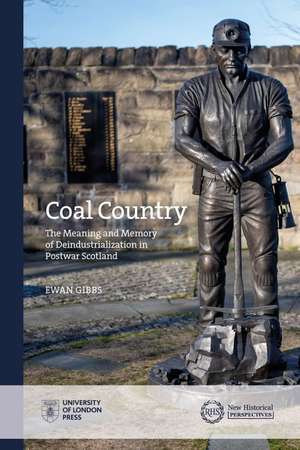Coal Country: The Meaning and Memory of Deindustrialization in Postwar Scotland: New Historical Perspectives
Autor Ewan Gibbsen Limba Engleză Paperback – 24 mar 2021
Din seria New Historical Perspectives
- 5%
 Preț: 184.13 lei
Preț: 184.13 lei -
 Preț: 288.49 lei
Preț: 288.49 lei -
 Preț: 393.69 lei
Preț: 393.69 lei -
 Preț: 283.65 lei
Preț: 283.65 lei - 18%
 Preț: 637.39 lei
Preț: 637.39 lei -
 Preț: 393.30 lei
Preț: 393.30 lei -
 Preț: 281.14 lei
Preț: 281.14 lei -
 Preț: 282.50 lei
Preț: 282.50 lei -
 Preț: 294.43 lei
Preț: 294.43 lei - 23%
 Preț: 596.36 lei
Preț: 596.36 lei - 23%
 Preț: 595.34 lei
Preț: 595.34 lei - 23%
 Preț: 595.34 lei
Preț: 595.34 lei -
 Preț: 435.66 lei
Preț: 435.66 lei -
 Preț: 441.12 lei
Preț: 441.12 lei - 23%
 Preț: 709.99 lei
Preț: 709.99 lei - 19%
 Preț: 584.70 lei
Preț: 584.70 lei - 23%
 Preț: 700.68 lei
Preț: 700.68 lei - 23%
 Preț: 707.92 lei
Preț: 707.92 lei -
 Preț: 320.10 lei
Preț: 320.10 lei -

Preț: 284.82 lei
Nou
Puncte Express: 427
Preț estimativ în valută:
54.50€ • 57.11$ • 45.05£
54.50€ • 57.11$ • 45.05£
Carte indisponibilă temporar
Doresc să fiu notificat când acest titlu va fi disponibil:
Se trimite...
Preluare comenzi: 021 569.72.76
Specificații
ISBN-13: 9781912702558
ISBN-10: 191270255X
Pagini: 250
Dimensiuni: 156 x 234 x 20 mm
Greutate: 0.45 kg
Editura: University of London Press
Colecția University of London Press
Seria New Historical Perspectives
ISBN-10: 191270255X
Pagini: 250
Dimensiuni: 156 x 234 x 20 mm
Greutate: 0.45 kg
Editura: University of London Press
Colecția University of London Press
Seria New Historical Perspectives
Notă biografică
Ewan Gibbs is a lecturer in history at the University of Glasgow.
Recenzii
“Required reading for anyone who wants to understand the history of Scotland.”
“The narratives in Coal Country are often so fascinating that they could be the basis of a short story.”
“Coal Country is a compelling account of industrial transformation and the fall of the carbon economy.”
“Ewan Gibbs excavates the deep history of coal mining in the Scottish central belt and his longer story of deindustrialisation in the Scottish coalfields is constructed from an impressive range of archival research as well as oral testimony, humanising a narrative that could be reduced to a mere accounting of the internecine struggles between industrial policy and unions. By giving voice to those on the ground, the workers are rescued from being mere bystanders to blind historical forces. . . . This inherited past that Gibbs delineates could prove invaluable for building a just future.”
“It’s notable that the two unanticipated successes in Scottish fiction last year—Shuggie Bain and Scabby Queen—both feature mining communities in a far from flattering light. [Coal Country] serves to counter the idea that working men are inherently violent, that pit closures must mean villages going to the dogs, that industrial workers must be sheep-like in their solidarity. This book adds much needed nuance to accounts of deindustrialisation in Scotland. . . Coal Country is a work of history which moves beyond the familiar symbols of deindustrialisation, and points instead to the rich legacy of mining in Scotland, an indelible stamp on the contemporary nation.”
“That I found this book a tough read is no criticism of the author but rather a reflection of the fact that I am of an age to have participated in and been influenced by some of the politics Ewan sets out in a work of history which, as he correctly observes, echo in and have resonance in today’s Scotland.”
History Book of the Year: Shortlisted
